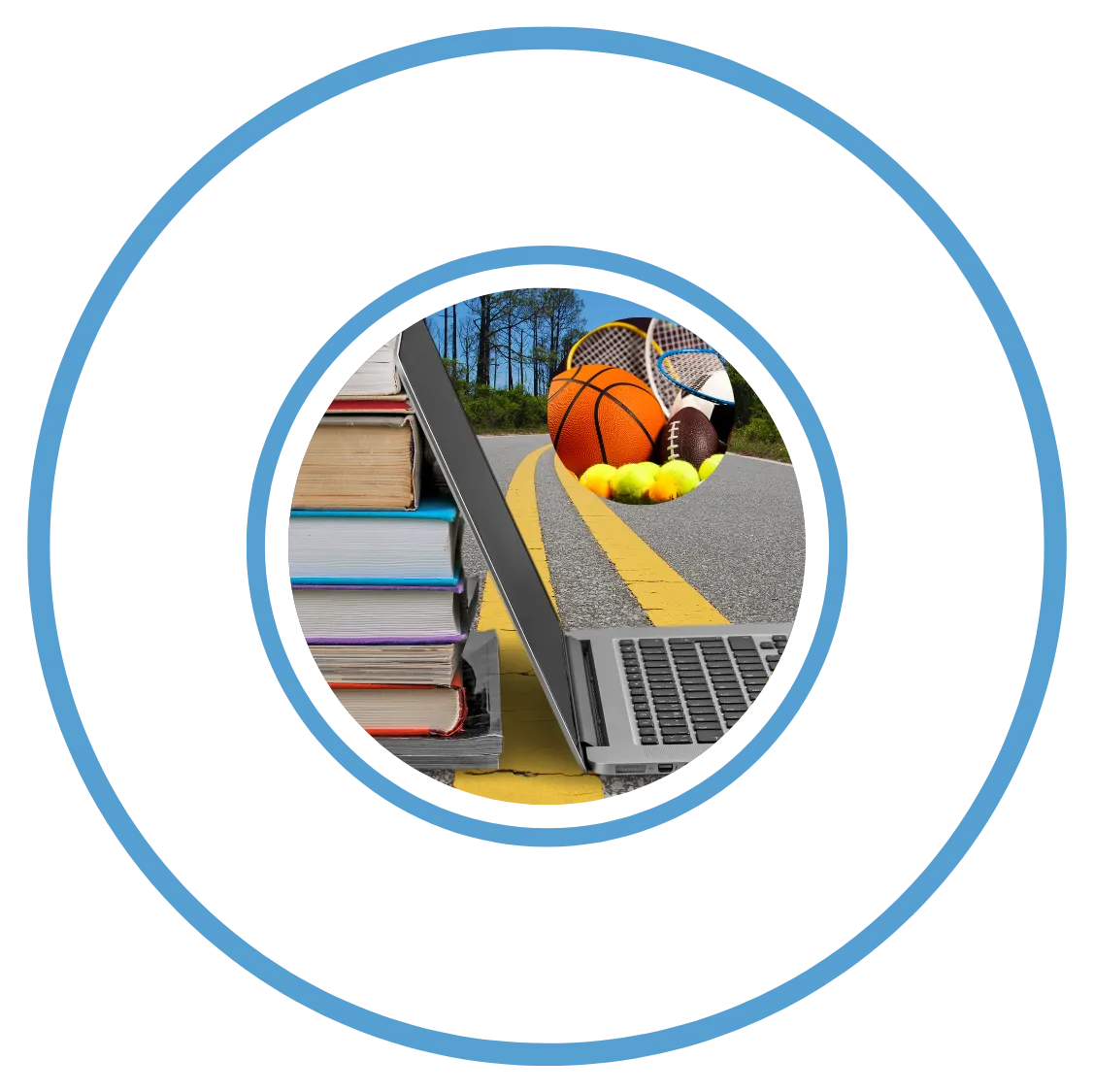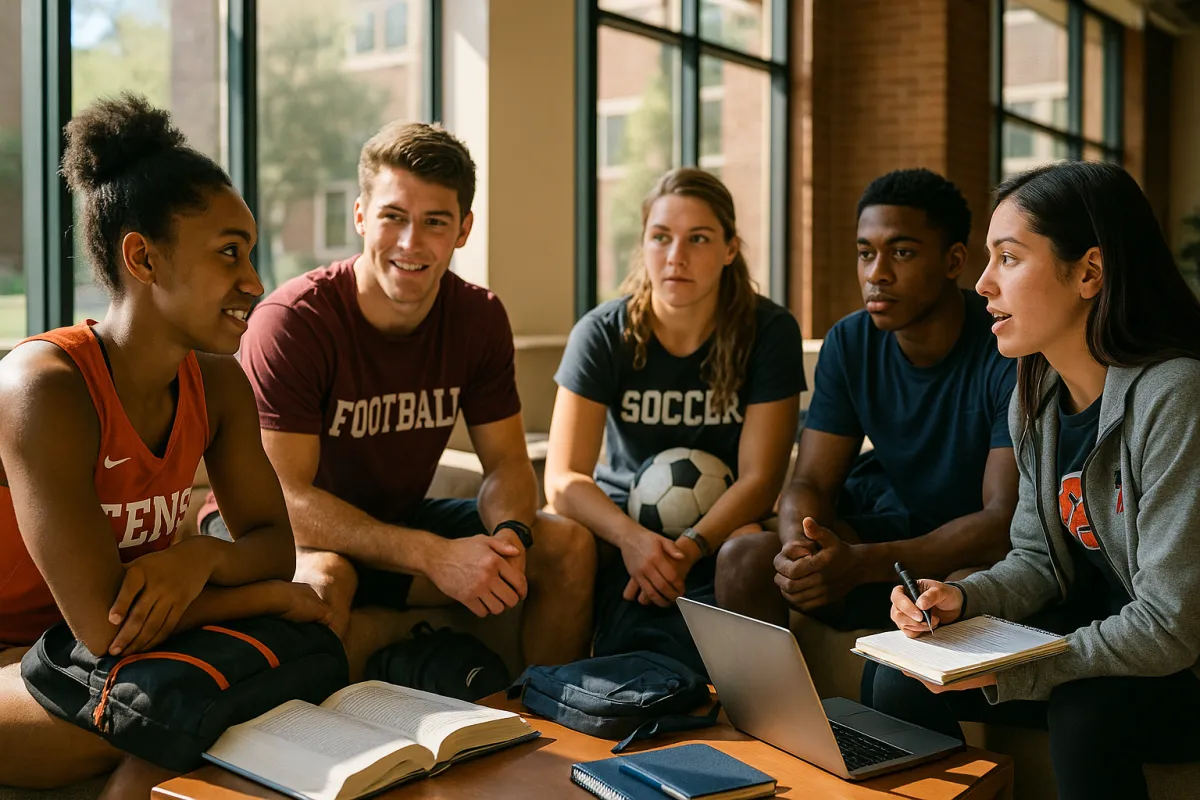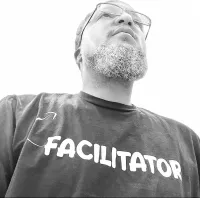

Your Success, Our Priority
Browse our articles below
Make sure to request our FREE Role Player Guide to Recruiting
Click the more stories button for additional articles

How To Navigate The Recruiting Maze: Phase 5 Integration: Adapt to College Life with Confidence
Phase 5 Integration: Adapt to College Life with Confidence
Every student-athlete faces a turning point when the season of transition ends and the real work of integration begins. College life brings fresh opportunities, new routines, and a level of independence that most have never experienced. Success now depends on how well they adapt to college by building relationships, learning expectations, and mastering daily demands. The right approach not only levels the playing field, it also sets the stage for long-term achievement on and off the court. This phase is not about surviving, it is about thriving. Here is how to take control, execute with clarity, and drive results from day one.
Building Relationships to Strengthen Your College Foundation
Strong relationships serve as anchors during the unpredictable tides of college life. Student-athletes who invest early in building authentic connections with teammates, coaches, professors, and campus staff create a network that supports both their personal growth and athletic ambitions. Each relationship becomes a resource. Teammates hold each other accountable and share insight on navigating campus culture. Coaches provide structure, feedback, and sometimes tough love that sharpens focus. Professors open doors through mentorship and academic guidance.
Actionable steps to build relationships:
Initiate conversations beyond practice or class. Ask questions that reveal shared interests and values.
Attend campus events, study groups, and team meetings with an open mindset.
Follow up with professors after class for clarification and to demonstrate engagement.
Leverage digital platforms to stay connected with both peers and staff.
For athletes seeking additional support, resources like the Role Player Guide to Recruiting and the FTP Information Portal help create a sense of belonging and direction. Building relationships is a continuous process, but every step adds stability and advantage.
Understanding Academic and Athletic Expectations
Collegiate expectations differ sharply from high school routines. Professors expect independent learning and critical thinking. Coaches demand consistency, discipline, and personal accountability. The student-athlete who learns to decode these expectations sooner gains momentum while others struggle to catch up.
Academic success hinges on understanding course syllabi, assignment deadlines, and each professor's communication style. Athletic success requires learning team systems, playbooks, and the unwritten rules that govern team culture. Both worlds reward preparation and proactive communication.
Key strategies for mastering expectations:
Review syllabi and team handbooks thoroughly. Highlight key dates and policies.
Schedule weekly check-ins with academic advisors and athletic staff.
Track assignments and workouts using digital tools for accountability.
Seek feedback early to correct course before minor issues grow into major problems.
Internal resources like Phase 4 Transition and Decision Fatigue in Recruiting articles offer insights on navigating these new demands. Mastering expectations is not a one-time task, t is a habit that drives consistent results.
Establishing Routines to Manage Daily Demands
Success in college hinges on routines that support both academic and athletic excellence. Student-athletes juggle packed schedules, shifting priorities, and the ever-present risk of burnout. Establishing systems to manage daily demands transforms chaos into control.
Effective routines include:
Dedicated study blocks that match peak focus times
Pre-planned meal prep and hydration strategies for peak performance
Mental health check-ins and stress management practices
Consistent sleep and recovery schedules
Digital tools and apps can automate reminders and track progress, but true routine comes from commitment. Resources from the Athletic Recruiting Rules and Get Your Mind Right articles reinforce the need for discipline. Control over routines creates space for both achievement and recovery.
Leveraging Campus Resources for Student-Athletes
Colleges offer a range of resources tailored to student-athletes, but many newcomers overlook these advantages. Academic support centers, athletic trainers, mental health counselors, and career advisors all exist to guide students through challenges and opportunities.
Quick wins for resource leverage:
Register with academic support services before challenges escalate
Attend workshops on time management, nutrition, and stress reduction
Meet regularly with athletic trainers to prevent and manage injuries
Connect with career services early to plan for life after graduation
Further reading from NAIA Mental Health Partnership and Overcome Impostor Syndrome in Sports highlights the importance of proactive help-seeking. Maximizing these resources amplifies both individual and team results.
Building Resilience and Mental Toughness
Adapting to college life tests every student-athlete’s mental toughness. New environments bring pressure, competition, and moments of doubt. Building resilience means responding to setbacks with action and learning rather than retreat. Mental strength is not just for game day, it is the edge that separates those who persist from those who plateau.
Proven ways to build resilience:
Set short-term, achievable goals for both school and sport
Reflect on setbacks to extract lessons and adjust strategies
Practice mindfulness or meditation techniques to regain focus
Surround yourself with a support network that challenges and uplifts
Articles like Develop Champion Level Confidence and The Sweet Spot for Athlete Growth offer actionable frameworks. Resilience is not just about surviving adversity; it is about turning obstacles into fuel.
Mastering Time Management for Academic and Athletic Balance
Time management ranks as one of the most powerful tools for college success. Student-athletes face competing demands, but those who master their calendars gain a strategic advantage. Balancing study, practice, travel, and downtime requires more than just good intentions, it demands systems and discipline.
Time management tactics:
Block time for focused study and non-negotiable practice sessions
Use digital calendars and reminders to prevent last-minute stress
Prioritize tasks daily, identifying what moves the needle most
Build in short breaks to recharge and prevent burnout
Guidance from the Triage Your Recruiting Process and What Comes Next articles sharpens focus on execution. Mastering time management is not about being busy; it is about being productive and present where it matters most.
Communication Skills for Navigating College Life
Clear, confident communication sets high-performing student-athletes apart. Navigating college demands expressing needs, giving feedback, and resolving conflict effectively. Those who communicate well build trust and avoid misunderstandings that can derail progress.
Develop communication skills by:
Practicing assertive but respectful dialogue with peers and staff
Using email and digital platforms professionally
Requesting feedback and acting on constructive criticism
Clarifying expectations and boundaries early in relationships
Resources like The Conversation and Stop Comparing reinforce the importance of open communication. Confidence in communication builds influence and respect across campus.
Maximizing Social Opportunities Without Losing Focus
College offers endless social opportunities, but these can distract from core goals if not managed. Student-athletes who strike the right balance grow their networks and experience campus life without sacrificing performance. Social engagement contributes to well-being and can be a source of motivation, but it requires boundaries and self-awareness.
Tips for maximizing social life strategically:
Choose events and groups that align with personal values and goals
Limit late-night commitments before games or exams
Build friendships with students outside athletics to broaden perspectives
Use social time to recharge, not escape responsibilities
More on this can be found in Celebrate Both: Academics and Athletics. Social balance is a skill that pays lifelong dividends.
Seeking Feedback and Owning Your Growth
Only those who seek honest feedback and act on it achieve real growth. College provides countless opportunities for feedback on the court, in the classroom, and throughout daily interactions. Student-athletes who request, receive, and act on feedback demonstrate maturity and a drive for excellence.
Ways to own your growth:
Schedule regular check-ins with coaches and professors
Track personal progress and set measurable targets
Welcome constructive criticism as a path to improvement
Reflect on feedback and adjust routines as needed
Articles like Improve Your Position and Mastering Good Enough reinforce the value of continuous improvement. Ownership of growth builds confidence and resilience that lasts well beyond college.
Driving Your Own Integration: The Power of Action
Integration is not passive. It demands active participation, relentless execution, and a willingness to adapt. Every decision a student-athlete makes shapes the trajectory of their college experience. Waiting for the perfect moment or outside validation delays progress. Those who take action, who ask questions, build relationships, and attack each challenge with purpose, gain control over their journey and create opportunities where others see obstacles.
Full integration happens when student-athletes consistently align their actions with their goals. The process is dynamic, shaped by every conversation, every choice, and every lesson learned. Those who commit to owning their integration journey not only adapt but also set the pace for others to follow. The field is wide open. The next step is yours.
Resources & Community
🎯
Follow Facilitate The Process on Facebook
https://www.facebook.com/facilitatetheprocess/
🌐
Join Our Recruiting Community
🔗
Get Started Today

